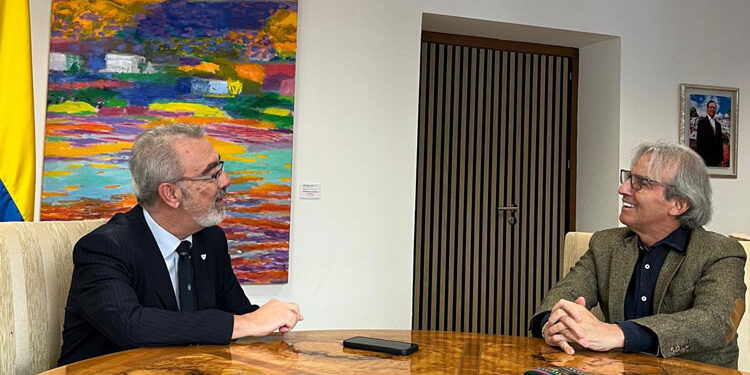Juan David Latorre
The 4th EU-CELAC Summit will be held in Santa Marta (Colombia) on 9 and 10 November. This edition will bring together heads of state and government from both regions. The Diplomat interviews the ambassador of Colombia in Spain, Eduardo Avila Navarrete, to tell us about the prospects offered by this next diplomatic appointment.
.- Dear ambassador, Colombia will host the IV European Union-CELAC Summit, what are the objectives of this upcoming meeting?
First of all, a special greeting to all the followers of The Diplomat in Spain. The main objectives of the 4th CELAC-EU Summit are, first, to renew that multilateralism and cooperation is the most effective way to respond to global challenges. Secondly, to consolidate a bi-regional partnership that translates into concrete benefits for our populations and strengthens our role as constructive actors in international governance. Colombia also wishes to promote decisions on the triple transition: energy, digital and environmental. Also, promote an effective cooperative approach that allows decisions to be translated into real projects for communities. Finally, nourish and project in the long term the content of the bi-regional dialogue with actions reflected in a biennial road map.
.- Last year’s Summit in Honduras highlighted the need for regional integration and called for dialogue to resolve differences. Have these objectives been achieved?
We are firmly moving towards more effective dialogue scenarios, therefore, in exercise of the Presidency Pro Tempore of CELAC, Colombia reaffirms its commitment to revitalizing dialogues with extraregional partners, including the bi-regional link with the European Union. The 4th EU-CELAC Summit is a strategic opportunity to translate political dialogue into concrete results, strengthening more balanced and mutually beneficial cooperation. Our main objective is to consolidate a unified Latin American and Caribbean voice that allows us to influence the great global transformations, promoting a shared agenda with the European Union in key areas such as energy transition, health self-sufficiency, regional trade integration and digital and scientific cooperation. Currently, trade between the two regions exceeds $200 billion annually, according to Eurostat (2024), which underlines the importance of deepening an effective and sustainable bi-regional dialogue.
.- Is it possible with the current state of the world, wars, pre-war movements and economic threats in the form of increased tariffs to promote peace, security and prosperity in the regions that make up the EU and CELAC?
It is always possible and absolutely necessary to promote peace and dialogue, even more so when international scenarios are complex; this is where we need to respond with innovative proposals that promote the dialogue between countries, respecting their sovereign decisions, in the words of President Gustavo Petro: “This is the time to redo things, to shake hands, to build a peace”.
.- Another strong point to be discussed at the upcoming Summit is cooperation on global challenges, such as global governance, international security and climate change. What can be done on these issues that are so important for the world’s future?
As a result of this IV Summit we will have the adoption of the CELAC-EU 2025 Declaration of Santa Marta, which will seek specific agreements in renewable energies, food security, sustainable financing and technological cooperation. We will also have the CELAC-EU Roadmap 2025-2027 which will accompany the declaration and set concrete actions to strengthen bi-regional cooperation in areas such as clean energy, digitalization, innovation, health, sustainable trade and social inclusion, to translate political commitments into tangible projects.
The Summit is expected to promote concrete actions of regional integration in the regional electricity interconnection, as a way to strengthen energy sovereignty and promote the transition towards clean sources. Technical and ministerial advances are also expected in the EU-LAC Global Gateway Investment Agenda, promoting sustainable value chains and strengthening bi-regional economic security. All these actions aim to advance the global challenges you have identified.
.- What does the holding of this upcoming Summit mean for Santa Marta and for Colombia in general?
It represents a unique opportunity to strengthen our bi-regional relations and build a shared future based on cooperation, sustainability and innovation. It demonstrates the international recognition of Colombia as a venue for the most important political dialogue between the European Union and Latin America and the Caribbean. It is a demonstration that our diplomacy is professional, modern and committed to regional integration.







